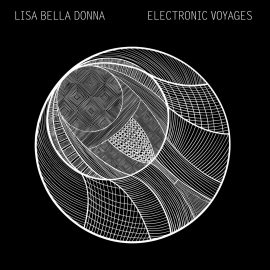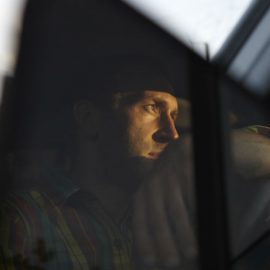
Interview with Gabe Koch
How would you describe Merck’s output when talking to someone not familiar with electronic music?
That’s one of my least favorite things about running my label, having to describe the music on it to people not familiar with electronic music. Mainly because you really can’t, especially in limited social situations. I know that most of the people who don’t know the term IDM before I meet them, will not really have any clear idea of the music I release after spending 5 minutes explaining to them about it. I generally describe it as electronic music, similar to Techno they may have heard, but that its “academic electronic music” made by 1 or 2 guys in their bedrooms at home. Not really meant for the dance floor in a club, but more for enjoyable listening and intellectual merit and respect. That of course sounds fairly lame, but I’d really rather be associated with Bill Gates than DJ Tiesto.
How did you get involved in electronic music? What did you do prior to starting Merck?
The first stuff that I would describe as electronic that I began listening to was Industrial in the very early 1990’s. Which soon brought me into Aphex Twin, The Orb, and so on. After that I was lucky enough to find the local electronic music radio show on a college station and began listening to (and taping) that. I was also into the internet fairly early, so I was using that as soon as I could to track down info about this kind of music and get a hold of as much of it as I could. I was even a member of the IDM List early on, and I have my name in the credits on the original Aphex Twin Discography (Shouts to Chris Miller!), probably the earliest and coolest music tool I ever saw on the internet (discogs still hasn’t come close to matching the detail on there). I started Merck while I was still at university, it initially wasn’t really much promise at being a money making enterprise, but eventually grew to support me meagerly while at school. Before that I was doing some network administrator stuff, which I continued to do part time in the early years of the label.
How did you discover the artists that got signed?
Initially they were all friends, or friends of friends that I knew from various online venues I hung out on. Eventually we started to get a few demos, but most of the artists on the label were found directly by me, or through artists on the label recommending people to me. The only artist who ever got a full release on the label through sending an unsolicited demo was probably Jimmy Edgar.
What were some of the challenges when running a label?
Getting paid is probably the biggest challenge. You’d think distributors and stores would want to get you money for the stuff they’ve sold of yours so you can turn it around and get out more releases and get them more stuff to sell, but that’s not usually the case. Finding more stores and distributors that are trustworthy and worth the time was another big challenge for expanding. So basically the business side of running an IDM label was the biggest challenges. For me, finding good music was never that hard. I had such a young and energetic group of friends and artists, and we had tapped into the resources of the internet well before most labels even knew what ADSL was. So I was able to amass quite a respectable group of artists from the various collectives from across the internet, as well as some nondigital places who were into our output and graphics. Same goes as far as graphics, we always had a cadre of awesome designers ready to do up great album art for us. Had the business marketplace been more hospitable to a label like ours, who knows what we could have done and accomplished.
How did the sound of Merck evolve and change over the course of seven years?
Well the first few discs are admittedly a bit immature looking back on them now, but at the time they got a decent welcome. We were able to learn from them quickly and improve the quality on the next few releases. So that by the time we were in double digits on the release numbers, I was quite confident in what we were doing, and am still quite happy with those releases looking back. We definitely evolved to include a broader variety of musical styles, from straight IDM, to ambient, to downtempo, to basically instrumental hip-hop, and then a few guitar based ventures here and there along the way to broaden the spectrum even more.
At what point did you decide to spawn off Narita and what was its focus?
I had friends and artists making great techno tracks, but I felt I couldn’t release them on Merck without a backlash for really broadening the label sound too much. We had snuck a few of them in on the Adam Johnson album, but I wanted to do more stuff like that. So I had a friend who had been working some P & D labels through Baked Goods/Boomkat in the UK. I asked him a bit about it, and then approached them about the idea of starting Narita as a P & D label through them of some IDM oriented techno stuff. The focus was techno that could be played by the likes of dancefloor DJ’s (and it was), that still had a very heady element and IDM tinge that the listeners with experience in the field could really pick up on. I’m really quite happy with what we released. The Arctic and Anders albums are still some of my favorite techno albums I’ve ever heard after almost 2 decades grappling with 4/4 music.
Let’s get it over with the dreadful question: why did you decide on closing Merck?
Yea, I’ve had to answer this question a lot. I wish there was one quick answer that I could give people, it would make my life a lot easier. But it was quite an array of things coming together at once that pushed me in the direction. In brief: IDM genre decline, artists changing sound or moving on, declining sales of music in general, increased (illegal) mp3 downloading, distributors fucking me, Europe melting down on the sales front, decline of electronic music (and music in general) in japan, a need to get a job that provides health care and a reasonable wage for the time I put into it, desire to get out of Miami, desire to stop thinking of all music as business, desire to go back to being a fan and listener. For even more detailed explanation there is an elaborate post and discussion on the subject on my blog.
And Narita?
It started off quite well, and through the promotion of the P & D outfit, it got some decent notice. But of course as was my experience with a lot of UK electronic music outfits (haven’t been paid from warp mart in years!), the monetary payment for our hard work was not forthcoming, and thus we had to taper it off and ultimately end it. Unfortunately with me, and a majority of the artists never making money for the music. There were some of the personal notions from above weighing on me as well, but without the label actually being based in Miami it took a considerable amount of the physical responsibilities out of running the label. Ultimately I really had no interest in doing the label anymore if the artists and I weren’t going to be making money off it, while someone else was. So people know, any Narita digital sale DOES go to the label (and physical sales of Melt and Terminal), but the Nightwidth physical CD, first 1000 Arctic CD’s, and all the Narita vinyls, almost none of the money from them actually reached the label.
Looking back at it now, do you think you could have done anything differently to avoid the closure?
Nah, I’m quite glad I quit when I did. Probably should have tried to quit 6 months or so earlier, as the last year of releases I’ve had to struggle selling the remaining stock. I maybe could have hired a full time business manager or something to maybe help make the label more profitable, but for that I probably would have had to sacrifice a lot of things about the label that made it so good and dynamic.
Can you comment on the current state of electronic music and the economics of the industry?
I don’t feel I’m that involved and aware of the the electronic music scene and industry as I was previously, to be running my mouth too much about it, so I’d rather not. Also because whatever view I have is not overly positive, and I don’t want to sound any more negative than I have already at various points in this interview.
This is a loaded questions, but do you have any ideas on how we can cure piracy?
Well, there is no cure really. Technology has made it possible to ‘use’ other peoples artistic creations without rewarding them for it, that will always be the case from now on for music (just like it was for books & copiers, movies & vhs, paintings & cameras). Though I think the eventual system I elaborate on in the next question will make piracy sometimes more trouble than its worth, and thus somewhat diminished.
What do you think it will all look like in the future?
The way I see it all developing eventually though is: Almost everything can be connected to the internet now, and almost all devices have the speed to run iTunes-like software. So my prediction is to see music listening moving away from peoples ‘collections’, and into a system where you just navigate some app on your always on internet music device, search for what you want, and hit stream and it starts playing. The idea of owning lp albums, cds, etc. will be quaint, but obsolete (though probably never go away). It will ultimately be a world where you can hear any music you want, at any time, almost anywhere. So hopefully someone builds a royalty based system that works through that system to either have end users pay a flat fee for monthly music usage, or charges fractional cent amounts for each play of a song, and then sends that along to the rights holders involved. That system should cut out as many middlemen as possible, and reward the artists quickly, and have a very efficient logistical setup for all involved.
What would you say to someone who’s interested in starting their own label?
Good luck! Haha. The function of ‘the label’ has really morphed a lot in the last decade or two. Now they really perform one (or both) of two functions. One is to be a promoter and marketer for a band and their music. The other is to be a quality control outlet that listeners can go to, to find music that they’ll most likely enjoy, but may not have found otherwise.
Any idea where some of Merck’s artists ended up, like Machine Drum, Proem, Ilkae, Proswell, Mr. Projectile, and Aphilas?
They’re all over the place, and as expected with people who almost all were never full time musicians, many have quit or moved on to other things. Machine Drum now runs the Normrex label. Proem released an ambient album not to long ago, has twin daughters, and still works on music. Ilkae as a duo is basically broken up, but the members continue to make music separately. Proswell is still making music and running Inpuj netlabel. Mr. Projectile I’m not really sure, and Aphilas pretty much broke up and stopped being involved in any kind of releasing.
Do you still keep in touch with the people in the scene or did you drop out completely?
I purposely cut off a bit of my communications lines between scene and artists of mine to make sure that I wasn’t tempted to get back into things. It was a bit unfortunate, but I know that after 7 years, I had to kinda rip the band-aid off, more than just slowly cut back the dosage. I still talk to most all of my artists every once in a while, and still try to pester the distributors who still owe me money.
Is the back catalog still available for sale, and if yes, where can we get it?
Yeah, we have all the cds and vinyl (plus a few shirts) that are still in print available from our mailorder over at: http://www.merchline.com/merckrecords . It will continue to be available there, while supplies last. We also have all the full artist albums available through most of the major digital retail outlets. Though all our compilation discs are available only in physical form.
Another defunct label, Neo Ouija, is trying to come back onto the scene. Any chance we’ll ever see the return of Merck or Narita?
As of now there are no plans to restart either label. My understanding is that Neo is/was coming back under someone else’s guidance. I also have no plans to ever allow anyone else to ever use the Merck or Narita names for any music purposes. Though I do plan to keep both labels websites going, as well as the full albums available for digital purchase. It would have to be some extravagant changes in my life for me to consider getting back into the music industry for any reason.
Are you working on anything music related right now?
I’m glad to say that I’m not at all. Not really involved in anything to do with the releasing of music at all. Except finding homes for the remaining merck inventory and importing my entire mp3 collection into Itunes.
What labels and artists do you follow these days?
Well… I tend to listen to quite a variety of music nowadays, and it changes from month to month, and most of it is not new releases. A lot of my time has been spent catching up on music that I missed during the 7 years I was running Merck, while my full fan/listener duties were being taken up mostly by running the label. In the last few weeks I’ve been listening to stuff on Statdgruen(netlabel) and Native State/Somnia. But I’ve also been listening to some old Ministry stuff, old Apocalyptica, Living Exponentially, 40winks, a couple things on Thinner (netlabel), a couple tracks from the Colapsus comp on SoundInk. For the most part I try and mention all notable things on my blog if I’m in the mood to type.
What is phonoforumdotcom?
Hmm, thats a long story about how I ended up with that domain, but just for the sake of brevity here its really just a domain I have pointed to my discogs marketplace account where I’ve been selling off a lot of the excess physical music I’ve collected over the last decade, plus a lot of merck rarities and special items (like test presses, etc.)
Tell us a bit about your blog, Merck Fragments.
I’m glad to say I’ve amassed a small(?) group of people who share a musical taste with me, and have an interest in what I’m listening to and thinking. So I started a blog to be able to communicate directly with them. Its mainly just a place for that. Not really trying to push any commercial interests, just keep the people who’ve been touched by Merck in the loop.
Thank you for your time. Any last words for the readers of Headphone Commute?
Thanks for reading this, thanks for listening to our music, and thanks for supporting artists that you enjoy!







